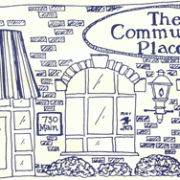Dealing With The Numbers
Everyone always says it’s not about the numbers. Let’s be honest, it is, at least partly, about the numbers. The reasons this is true are many. First off, each ‘number’ is a living soul created by God for His own good pleasure. Each person was created to worship God alone. The more of them that are assembled together, the better. Secondly, it’s really the only way to assess how a church plant is doing. When you begin a church and there are only a handful of people there, you’ll know if you are being effective if you see numerical growth. Thirdly, whatever organization you are involved with, when they want to know about the ministry you are involved in, if you don’t offer up the count, they will ask. Every group or organization will want to know the numbers. I could do this all day, but let’s move onto some more productive thoughts.
As a church planter, it is very easy to have your joy bound up in the number of people who come. This isn’t only true of church planters; this is true of all ministers in every context. Jesus speaks of this when the seventy-two returned from doing ministry and as they debriefed Jesus on what had transpired. “The seventy-two returned with joy, saying, “Lord, even the demons are subject to us in your name!… Nevertheless, do not rejoice in this, that the spirits are subject to you, but rejoice that your names are written in heaven.”” (Luke 10:17, 20, ESV). Notice how Jesus reminds them that their joy and identity must not be bound up in their perceived success (or for some of us, our perceived lack of success), but solely in the completely gracious salvific work of Jesus Christ. We must begin by asking ourselves if our joy is bound up in the numbers of people who come. If it is, we must repent. We cannot serve two masters brothers.
At this point, what I’d like to do is give some random exhortations as to how we are to deal, within our own hearts and in our conversations, with numbers. I share these from very personal experiences. I imagine that not all of these exhortations with apply to all of us, but some will undoubtedly apply. In sharing these, I hope to encourage you all to learn from my misunderstandings and mischaracterizations.
Expect 40 people in 4 Years
I know, I know, that sounds horrible. Just 40 people in 4 years? Yes, 40 people in 4 years. I say that you should expect that. The reason that I encourage guys to expect this number is because 7 out of every 8 church plants fail. There are a great many reasons why the vast majority of church plants fail but one reason is that planters have unrealistic expectations. When a man feels called by the Lord to start a church, there tends to be an expectation that the Lord is going to blow the doors off of the place. We all expect that when we set the sign out in front of the building that the people are just going to pour in, climbing over one another to see the work of the Lord. But most often, especially if you are planting in the 21st century, this doesn’t happen. Many church plants close their doors within the first few years because there isn’t explosive growth. The Lord has many reasons for the slow and steady growth of the church (some of which include preparing and humbling the pastor, preparing the community, lessons in faithfulness and trust, the sovereign timing of God, etc). Not to mention that every area is different. Some areas have a lot of Christians, but they are mostly plugged into solid churches. Some areas have no solid churches and lots of unattached believers. Some areas have virtually no believers. Every area is unique and this will affect the growth possibilities. Statistics teach that if a church has 40 people after 4 years, then they are often sustainable. You have to remember that the 60% of churches in the United States are less then 100 people. Add to that the fact that only 2.5% have more than a thousand attendees. What this teaches us is that churches are a lot smaller than we tend to think. I would encourage you to set much more lofty goals than 40 in 4 years. But only expect that many.
Don’t Forget Attendance will Ebb and Flow
Most church plants begin very humbly so the changes in attendance are easily observable. Like waves crashing on the seashore, church plant attendance will come and go. Because of this, it is very common for a church plant to have 25 people. Then, seemingly all of a sudden, have 50 people. Then settle back to 35 people. Then swell to 70 people. Only then to pull back again to 50 people. This is very common. If you are given to joy at growth and despair at seeming decline, this phenomenon will put you on an emotional rollercoaster. One of the ways that the Lord has ministered to me in this process was to force myself to judge the numerical growth of the ministry on a year-by-year basis only. I acknowledge and expect the ebb and flow of attendance, but only make final declarations on growth based on year-to-year movements. Don’t forget that church attendance has a tendency to go down during the summer months then way up in the fall. Depending on where you live, the winter months can be sparse due to weather conditions. To give you an example, here at Calvary North Bay, Mill Valley, CA, which is two years old at the time of this writing, began with two families (3 adults and 3 children). At the end of our first year, we had about 40 steady attendees. At the end of our second year, we had about 80 regular attendees. That is quality growth when looked at on a year-by-year basis. But within the last year, we would have a few Sundays with 100 people and then two months later have 50 people for a few weeks. So for sanity’s sake, don’t forget that the attendance will ebb and flow. Try and enjoy the variations. Also don’t forget that like a little child, the most drastic changes will be in the first number of years. Scientists tell us that people grow more from one day to six years of age, than in any other span in their lifetime. Church plants are the same. Calvary North Bay doubled in size last year. My guess is that the average mega-church did not. But they are incalculably different and really cannot be compared.
Focus on Incremental Benchmarks
I have found a great blessing in having an incremental perspective of church plant growth. It’s hard to tell when a church plant can shed the ‘plant’ moniker. Does a church plant become just a church after a certain amount of time or because of certain number of people or because of a certain sized leadership or because they own a building? This I really don’t know. Because of that, depending on your perspective, you can always be striving toward very aggressive goals to your own detriment. When I was involved in the first church plant (2002 in New Brunswick, NJ), I was blessed to have a person encourage me to have an incremental perspective on the numbers. When I started in New Jersey, I was single man and there was no core team to start the ministry with. So my first goal was to hit the ten-person mark. After that was attained, my next benchmark was twenty-five people. After that it was forty people. That same idea would then continue on and on. This was a blessing because when you are at ten people, one hundred people seems almost unattainable and can be very disheartening to be judged against. So set for yourself attainable incremental benchmarks.
Like the Apostle Paul, Learn in ALL Things to be Content
When a church planter tells me that there are 40 people coming, I know that there are really only 25. If he says 75, I figure that realistically there are only 50. The sin of exaggeration bites us all. Mostly this happens because we have learned that people will think we are more effective if we inflate the numbers a little bit. We need to rigorously resist this temptation. If the Lord has blessed you with 40 people at this point in your ministry, they are His 40 and they are to be rejoiced in as such. The Lord saw fit to entrust to you 40 of His precious little lambs! They are His sheep and He distributes them as He sees fit. It is not our job to exaggerate numbers to commend the praise of man. This demeans the work of God in your midst. Don’t feel that you need to apologize for the work that is His. Rejoice that He lets your care for any of His own!
Don’t Focus on Who Is NOT There, Love the Ones Who ARE There
It has been said that the church will not grow if you have a huge front door (where new people enter) and an equally huge back door (where established people leave). If you are completely numbers driven in your self valuation, you will always be focused on what you don’t have, rather than what you do. What good is it if 50 new people show up while the 50 that you have are on the way out the back door. A minister is called to love and feed the sheep. His task is to care for the sheep in his care, not to obsess about the sheep that he hoped would be there but weren’t. Brothers, love the people that the Lord has brought to you. Love them and labor for their joy in Christ. If there are 5 people there, proclaim the glories of God in the face of Jesus Christ with the same zeal and passion as if there we 5000. Let those people know the love of God as it flows from Him to and through you and onto them. If you are too busy focusing on the lack of attendance, you’ll miss out on the ministry that God has given you among those who are there.
Finally, Don’t Ever Forget that Numerical Growth is Solely Up to the Lord
This might seem like a given, but it is still worth it to mention. The Lord adds to His church those who are being saved. No sermon or altar call ever saved a man. People are saved by the sheer grace of God and His Spirit drawing them and working in them. Yes, the Lord may use a sermon or an altar call as the instrument, but the instrument can take no credit. The most amazing Stradivarius violin will not sound great if my four-year son was playing it. But an excellent instrument in the hands of a world-class musician will make beautiful music. The work of adding to church is God’s work. He loves to glorify Himself in using human vessels, but that is solely His prerogative. If you have planted a church and it grew like gangbusters, all the glory is His. If you planted a church and it hasn’t grown, all the glory is His.







 ). They only did Tomlin and Hillsong. Oh man, I was so into it – I just closed my eyes and raised my hands. It’s so great to worship Jesus.”
). They only did Tomlin and Hillsong. Oh man, I was so into it – I just closed my eyes and raised my hands. It’s so great to worship Jesus.”


